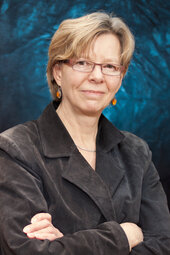Thursday 14 November 2013
The Holst Memorial Lecture and Symposium are organized by Philips Research and the Technische Universiteit Eindhoven (TU/e). This year’s Holst Lecture, the 37th since 1977, will be held by Prof. Cherry A. Murray, Ph.D, Dean of the Harvard School of Engineering and Applied Sciences.
Symposium Engineers of the Future and New Frontiers of Technology
The theme for the Symposium and the Holst Lecture target various aspects of challenges facing Academia (and Industry) when it comes to educating ’the engineers of the future’. The landscape is changing rapidly. The rise of smart machines, a globally connected world, superstructured organizations and emerging new technologies will all have their influence on higher education in general and engineering education in particular. Engineers of the future need to be able to make connections with ever expanding frontiers of science and technology and different fields of expertise and use this knowledge and these insights in their work. This holds for aspects like behavioral influence and social cohesion, but also for what we can learn from nature.
Holst Medal Recipient 2013

Cherry A. Murray, who has led some of the USA’s most brilliant scientists and engineers as an executive at Bell Laboratories and the Lawrence Livermore National Laboratory, was appointed dean of Harvard University’s School of Engineering and Applied Sciences in 2009. She holds the John A. and Elizabeth S. Armstrong Professorship of Engineering and Applied Sciences at that university. Her research interests include nanophotonics, soft condensed matter and surface and interface sciences. She holds a BSc and a Ph.d, both in Physics, from the Massachusetts Institute of Technology and is a former President of the American Physical Society. She has served on more than 80 national and international scientific advisory committees, governing boards and National Research Council panels.
Speakers Symposium
Tim Salimans, Ph.D

Tim Salimans is a founding partner and data scientist at predictive analytics consulting firm Algoritmica, where he helps innovative companies build predictive models for marketing, customer engagement, risk, fraud, supply chains, maintenance, and more. He holds a PhD in Econometrics from Erasmus University Rotterdam, and he did Machine Learning research at Microsoft Research Cambridge. Tim is the winner of several predictive modeling competitions on Kaggle.com, and he received a top lecturer award from the Erasmus School of Economics for also bringing these competitions to the classroom.
Peter-Paul Verbeek

Peter-Paul Verbeek (1970) is professor of philosophy of technology and chair of the Department of Philosophy at the University of Twente. He is president of the Society for Philosophy and Technology and a member of the Dutch Council for the Humanities. Between April 2011 and April 2013, he was chairman of the ‘Young Academy’, which is part of the Royal Netherlands Academy of Arts and Sciences. Among his publications are Moralizing Technology: Understanding and Designing the Morality of Things (University of Chicago Press 2011), De Grens van de Mens: over techniek, ethiek en de menselijke natuur (Lemniscaat, 2011) and What Things Do: Philosophical Reflections on Technology, Agency, and Design (Penn State University Press 2005).
Thomas Speck

Thomas Speck studied biology at the University of Freiburg, finished his PhD in 1990 and received 1996 after his habilitation the venia legendi for botany & biophysics. After a visiting professorship at the University of Vienna, Thomas Speck received offers for professorships at the Humboldt-University in Berlin and at the University of Freiburg. From 2002 until 2006 he was associate professor for ‘Botany’ at the University of Freiburg and director of the Botanic Garden. In 2006 he received an offer for a full professorship at the Freie University Berlin combined with the directorship in general of the Botanic Garden & Museum Berlin-Dahlem. He decided to stay as director of the Botanic Garden in Freiburg and holds since 10’2006 the chair for ‘Botany: Functional Morphology and Biomimetics’.
Cees Dekker

Cees Dekker (1959) is known for his research on carbon nanotubes and molecular biophysics. He has more than 200 publications, including more than 20 papers in Nature and Science. Four of his group publications have been cited more than 1000 times, 25 papers got cited more than 100 times, and in 2001, his group work was selected as "breakthrough of the year" by the journal Science. In recognition of his achievements, Dekker has been elected Member of the Royal Netherlands Academy of Arts and Sciences and Fellow to the American Physical Society and the Institute of Physics. He was awarded a number of national and international prizes, including the 2001 Agilent Europhysics Prize and the 2003 Spinozapremie. He also was granted an honorary doctorate from Hasselt University, Belgium.
Interesting links
-
Contact
Bart HofmanAmin FarahPosthof3871GE Stramproy